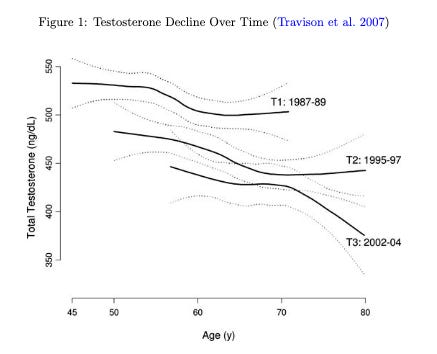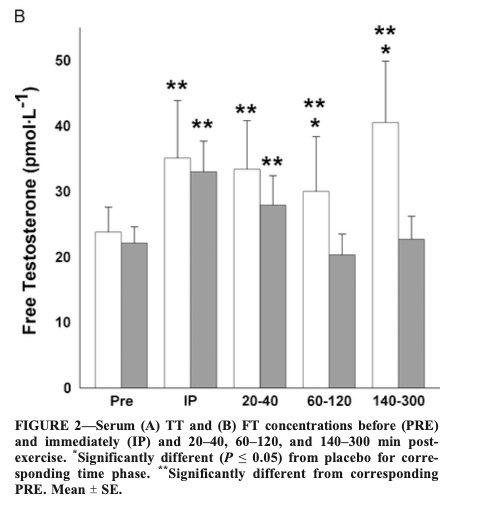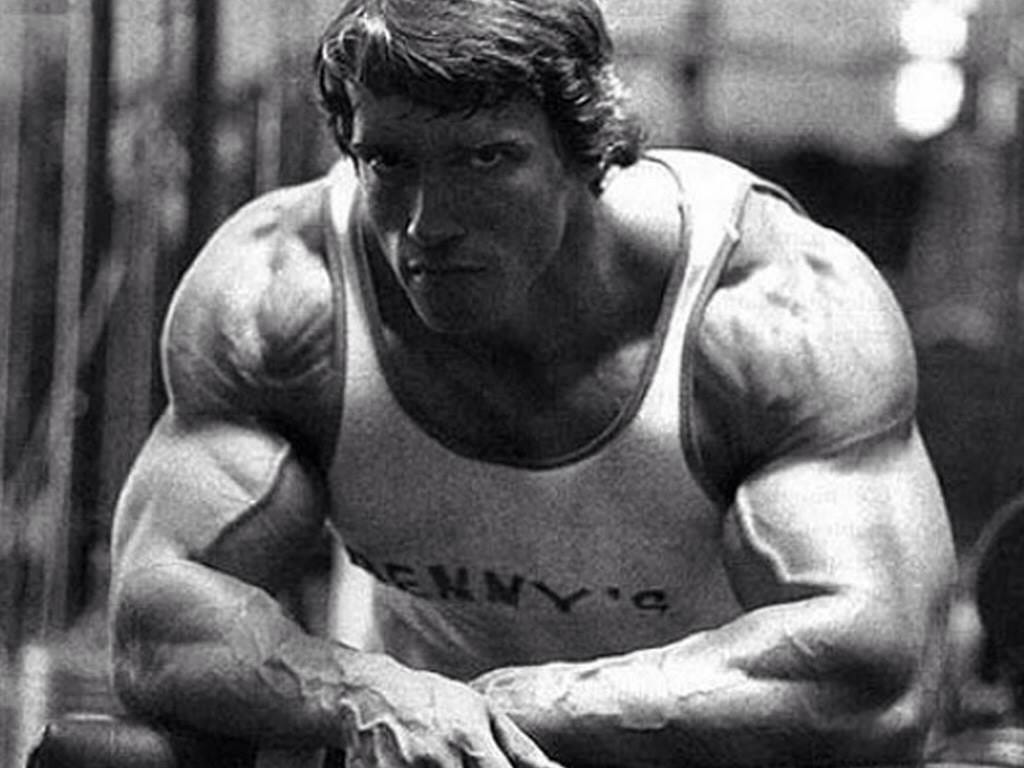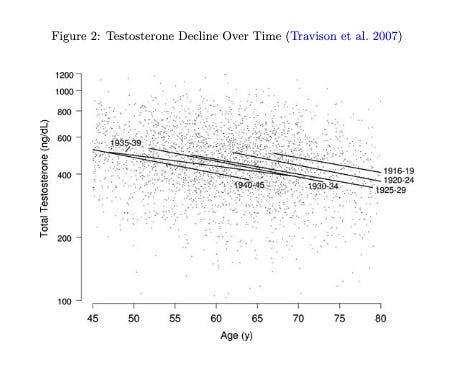It's All About Testosterone
This is the first of a series of articles we are doing on testosterone. This post will focus on testosterone (T) levels over time, the effects of lowered T, and a broad survey of the latest research on naturally increasing testosterone levels. Be sure to subscribe and follow us on Twitter to get notified of our next post.
Testosterone has been a more and more prevalent topic of conversation - Joe Rogan, Andrew Huberman, and other mainstream media figures have openly talked about using testosterone replacement therapy to raise their testosterone levels. It’s widely speculated that Jeff Bezos, who gained a lot of muscle mass in his 50s, also used TRT. It’s natural that testosterone can decrease when you age. However testosterone levels are decreasing over time, and at a quite alarming rate. This trend has been noted by multiple studies, with the first and most notable study published in The Journal of Clinical Endocrinology & Metabolism by Travison et al. (2007) and results summarized in Figures 1 and 2 below.
Testosterone levels are dropping and have been steadily since they have been measured. These changes are significant - with a close to 25% drop in average T levels in the 25 years between the first and last cohort
Testosterone is also dropping faster as people age - so not only are people entering middle age with less T, they are losing the T they have faster. This is shown most clearly in Figure 1 (line labeled T3)

When you expand your view to look at the T levels of people born at different times, the reduction in total testosterone over time becomes even more apparent. Looking at 65yo men born in 1945 versus 1920, their T is on average 30% lower.
Having low testosterone doesn’t sound good, but exactly how impactful is low T for most men? Short answer - very impactful. Testosterone has numerous effects throughout the body including an impact on metabolic pathways, so deficiency of testosterone will hurt you everywhere. Testosterone helps increase insulin sensitivity - regulating the uptake of sugar, weight gain, and body fat. There’s a complicated and bidirectional relationship between testosterone and body fat. Low testosterone will lead to obesity through insulin resistance, but obesity itself leads to an increase in expression of the enzyme aromatase, which will convert testosterone to estrogen, lowering testosterone and furthering the cycle. It’s a vicious cycle no one wants to get caught in.
To imagine the systemic effects of testosterone on every cell in your body think of differences between typical male and female phenotypes. They’re largely due to hormonal differences, especially during critical developmental years with higher androgen receptor count and sensitivity. Testosterone increases muscle mass, it increases red blood cell production, and it increases bone density. Testosterone also has neuro-psychiatric effects relating to mood, focus, energy level, sex drive, sleep, and pretty much everything your brain does. Low testosterone will make it hard to sleep, it’ll make it hard to experience sexual arousal, and you’ll probably feel bad. It is largely the effect of androgens like testosterone that physically and mentally differentiates us into men as we develop and keeps us that way. Deficiency of testosterone leads to the absence of these defining characteristics. We are just beginning to feel the impact on chronic disease and lifespan.
If a man’s total testosterone levels are far below normal (the medical community commonly defines this threshold as less than 300 nanograms per deciliter), this is considered hypogonadism. Most doctors will prescribe supplemental testosterone replacement therapy at these levels, otherwise quality of life is greatly reduced. However most men will still feel a strong effect from higher or lower T levels, even if they are well within normal range.
The Research
Thankfully, there has been extensive and occasionally conclusive research on what environmental and lifestyle factors effect testosterone levels. As always, we’ve assembled some of the most relevant recent papers on the topic, linked below. The main factors most people should be concerned about are:
Exercise (Intensity and Strength Training)
Diet
Sleep
Vitamin Supplements
Vitamin D
Zinc & Copper
Ashwagandha
Below we include a couple papers that dive into each area, as well as a few more that investigate combined effects, or are otherwise interesting. The last paper we link was a fun one, as you might imagine given the authors research focus is on drunk, jacked rats:
Exercise
Different responses of selected hormones to three types of exercise in young men.
Journal: European Journal Of Applied Physiology
Authors: Keith A Stokes, Kate L Gilbert, George M Hall, Robert C Andrews, Dylan Thompson
Publication Date: 2013-08-23
SHAPER's Take: You just gotta lift heavy. Stokes et al. provide insights into natural methods to boost hormone levels through various forms of exercise, highlighting that resistance exercise, of the types tested, significantly ramps up testosterone production in men. This research is particularly compelling as it differentiates how specific exercise modalities distinctly influence hormones like testosterone, useful for individuals seeking natural ways to enhance their hormonal health. The real-world relevance lies in helping men choose appropriate exercises for targeted hormonal benefits, potentially improving their overall well-being without pharmacological interventions.
Acute hormonal and neuromuscular responses to hypertrophy, strength and power type resistance exercise.
Journal: European Journal Of Applied Physiology
Authors: Grant O McCaulley, Jeffrey M McBride, Prue Cormie, Matthew B Hudson, James L Nuzzo, John C Quindry, N Travis Triplett
Publication Date: 2009-05-04
SHAPER's Take: Ok so you are lifting heavy - what exercises should you do? It turns out the body builders (or as we like to call them, “mass monsters”) were right on this one. While using machines in the gym will still positively improve your health, free weights provide a stronger result w.r.t hormone levels. Many weightlifting experts will also recommend free weights for muscle growth, strength, and injury prevention. McCaulley et al. demonstrate that hypertrophy-focused resistance training, characterized by moderate weights and higher repetitions, notably raises testosterone levels immediately following exercise, compared to strength or power regimens with heavier weights or explosive movements. This paper suggests that for men looking to naturally boost their hormone levels, adjusting their workout style to include more hypertrophic exercise could be advantageous. This insight is particularly valuable for those interested in optimizing hormonal health through exercise, rather than relying on synthetic alternatives
Effects of strongman training on salivary testosterone levels in a sample of trained men.
Journal: Journal Of Strength And Conditioning Research
Authors: Jamie J Ghigiarelli, Katie M Sell, Jessica M Raddock, Kurt Taveras
Publication Date: 2013-11-18
SHAPER's Take: This is a very practically useful paper as it lays out specific exercises that will maximize your T levels. Ever seen the “World’s Strongest Man”? Well, basically do that:
Ghigiarelli et al.'s research demonstrates how strongman and hypertrophic training protocols can significantly boost testosterone levels, with hypertrophic routines showing the highest spike. This insight is particularly valuable for individuals seeking natural methods to enhance testosterone, which is linked to improved muscle mass, energy levels, and overall health. The study provides a useful comparison of exercise impacts on hormonal responses, suggesting practical workouts that the average person could incorporate to manage or increase their testosterone naturally.
The effect of resistive exercise rest interval on hormonal response, strength, and hypertrophy with training.
Journal: Journal Of Strength And Conditioning Research
Authors: Robert Buresh, Kris Berg, Jeffrey French
Publication Date: 2009-05-05
SHAPER's Take: If you don’t have a giant tire on hand - don’t worry. Most people will see strong results from all sorts of different strength training regimens. Buresh et al.'s findings focuses on the impact of rest intervals during resistance training on hormonal fluctuations, particularly testosterone, in initially untrained males. While they replicate previous findings about shorter-rest intervals giving higher acute hormonal responses over the first few weeks of training, this effect doesn’t persist in the long-term. There are a series of similar results across other articles.
The takeaway? - No need to autistically micromanage every tiny detail of your training schedule. Rest intervals are not a huge deal, hormonally at least. The key point is to lift heavy and make sure you get in the gym on a regular basis. Consistency is king.
Diet
Effects of Ketogenic Dieting on Body Composition, Strength, Power, and Hormonal Profiles in Resistance Training Men.
Journal: Journal Of Strength And Conditioning Research
Authors: Jacob M Wilson, Ryan P Lowery, Michael D Roberts, Matthew H Sharp, Jordan M Joy, Kevin A Shields, Jeremy M Partl, Jeff S Volek, Dominic P D'Agostino
Publication Date: 2021-04-02
SHAPER's Take: Diet is important to hormone levels as well. Eating a healthy, high-protein diet supports fat loss and post-workout recovery. Higher body fat has been shown to discourage testosterone production. Wilson et al. demonstrate that a ketogenic diet paired with resistance training not only supports favorable body composition by increasing lean body mass and decreasing fat mass but also naturally boosts testosterone levels in resistance-trained men. This insight can guide individuals looking to enhance muscle growth, strength, and hormonal health through dietary adjustments.
Very low-calorie ketogenic diet rapidly augments testosterone levels in non-diabetic obese subjects.
Journal: Andrology
Authors: Angelo Cignarelli, Daniele Santi, Valentina Annamaria Genchi, Eleonora Conte, Fiorella Giordano, Simona Di Leo, Annalisa Natalicchio, Luigi Laviola, Francesco Giorgino, Sebastio Perrini
Publication Date: 2023-01-17
SHAPER's Take: Very overweight people tend to have very low testosterone, often far below healthy levels, a condition known as hypogonadism. The key question is how to break this cycle, because calorie restriction results in even more severe testosterone level drops in the short-term.
Cignarelli et al.'s research demonstrates a way around this, measuring a rapid and significant increase in testosterone levels through a very low-calorie ketogenic diet in obese non-diabetic men. This highlights a potentially effective dietary strategy for managing functional hypogonadism associated with obesity. Their findings suggest that dietary modifications alone can play a pivotal role in hormonal balance, offering an accessible intervention for improving testosterone levels without pharmacological means. This approach could be particularly beneficial for men seeking natural methods to enhance hormonal health and reverse obesity-related hormonal imbalances.
Neither soy nor isoflavone intake affects male reproductive hormones: An expanded and updated meta-analysis of clinical studies.
Journal: Reproductive Toxicology (Elmsford, N.Y.)
Authors: Katharine E Reed, Juliana Camargo, Jill Hamilton-Reeves, Mindy Kurzer, Mark Messina
Publication Date: 2021-10-28
SHAPER's Take: We’re still gonna call people “soy boys” if we want to. However, the link between soy consumption and reduced T levels is very weak to non-existent. Reed et al.'s research is significant as it clarifies the misconception that soy products and isoflavones adversely affect male hormone levels, confirming that consuming soy does not lead to decreased testosterone or altered estrogen levels in men. The study is noteworthy for debunking widespread myths about the feminizing effect of soy on male reproductive health, thereby providing reassurance to consumers about the inclusion of soy in a balanced diet. Regarding naturally increasing testosterone levels in men, it's essential to focus on well-supported lifestyle and dietary practices. Regular physical activity, particularly strength training and high-intensity interval training, has been shown to boost testosterone levels effectively. Adequate sleep, stress management, maintaining a healthy weight, and a balanced diet rich in vitamins and minerals also contribute to optimal testosterone production.
Sleep
Sleep deprivation lowers reactive aggression and testosterone in men.
Journal: Biological Psychology
Authors: Kimberly A Cote, Cheryl M McCormick, Shawn N Geniole, Ryan P Renn, Stacey D MacAulay
Publication Date: 2013-08-20
SHAPER's Take: Much of your body’s testosterone is produced when you sleep. That’s why when you get a T-test, most testing facilities require you do so in the morning. It’s not surprising then that sleep deprivation can greatly lower testosterone levels. Cote et al.'s findings are crucial in highlighting the significant impact of adequate sleep on maintaining hormonal balance and reducing aggressive responses in men. This research is particularly relevant for the general population as it underscores the potential of proper sleep hygiene to naturally regulate testosterone levels and modulate behavior, providing a non-pharmaceutical strategy to enhance mental and physical health.
The cost of the circadian desynchrony on the Leydig cell function.
Journal: Scientific Reports
Authors: Maja V Pavlovic, Dijana Z Marinkovic, Silvana A Andric, Tatjana S Kostic
Publication Date: 2022-09-19
SHAPER's Take: Pavlovic et al.'s research highlights the negative impact of irregular light exposure, resembling shift work, on testosterone production in rats. By demonstrating how disrupted sleep patterns can lead to decreased testosterone levels through mitochondrial dysfunction in Leydig cells, this study provides insight into natural ways men might enhance their testosterone levels by maintaining regular circadian rhythms. This could be particularly useful for shift workers or those with irregular sleep schedules seeking to improve their hormonal health.
Vitamins
Influence of Sunlight and Oral D3 Supplementation on Serum 25(OH)D Concentration and Exercise Performance in Elite Soccer Players.
Journal: Nutrients
Authors: Małgorzata Magdalena Michalczyk, Artur Gołaś, Adam Maszczyk, Piotr Kaczka, Adam Zając
Publication Date: 2021-02-17
SHAPER's Take: Michalczyk et al.'s research demonstrates that exposure to sunlight and supplementation with vitamin D can significantly increase serum vitamin D and testosterone levels in elite soccer players. This suggests that similar strategies could be employed by the average man to naturally enhance testosterone levels, potentially improving physical performance and overall hormonal health. This study underlines the importance of maintaining adequate vitamin D levels for hormonal balance and athletic performance, indicating a straightforward intervention for testosterone management through lifestyle and dietary changes.
Effect of oral zinc therapy on gonadal function in hemodialysis patients. A double-blind study.
Journal: Annals Of Internal Medicine
Authors: S K Mahajan, A A Abbasi, A S Prasad, P Rabbani, W A Briggs, F D McDonald
Publication Date: 1982-10-21
SHAPER's Take: Mahajan et al.'s research demonstrates that zinc supplementation can significantly enhance testosterone levels, as well as sperm count and quality, in hemodialysis patients, indicating a simple, nutrient-based approach may be beneficial for managing hypogonadism in this population. This finding suggests potential broader implications for non-uremic individuals seeking natural methods to improve their gonadal function and general reproductive health. Further exploration might reveal whether similar benefits can be realized in the general male population, offering a non-pharmacological option to boost testosterone naturally.
Correlation between serum testosterone level and concentrations of copper and zinc in hair tissue.
Journal: Biological Trace Element Research
Authors: Chung Soo Chang, Jong Bo Choi, Hae Jin Kim, Sat Byul Park
Publication Date: 2012-04-27
SHAPER's Take: Chang et al.'s research reveals significant links between trace minerals in the body and testosterone levels, highlighting that higher zinc levels are associated with normal testosterone levels, while elevated copper and copper/zinc ratios are connected with reduced testosterone. This finding offers a potentially natural method for managing testosterone levels through dietary adjustments, emphasizing the influence of nutrient intake on hormonal health. This insight can guide individuals in modifying their diet to possibly enhance or maintain their testosterone levels naturally without pharmacological interventions.
Examining the effect of Withania somnifera supplementation on muscle strength and recovery: a randomized controlled trial.
Journal: Journal Of The International Society Of Sports Nutrition
Authors: Sachin Wankhede, Deepak Langade, Kedar Joshi, Shymal R Sinha, Sauvik Bhattacharyya
Publication Date: 2016-08-16
SHAPER's Take: While “natural supplements” are mostly charlatan nonsense and occasionally just poison, it seems like ashwagandha has some pretty strong effects across the ~60 people or so studied here. Wankhede et al.'s findings demonstrate that ashwagandha supplementation can significantly enhance muscle strength and recovery while boosting testosterone levels in men undertaking resistance training. This suggests a natural, plant-based approach to potentially augment fitness outcomes and hormonal balances, providing a beneficial option for men seeking improvements in these areas without synthetic interventions. The increase in testosterone may particularly appeal to those dealing with low levels, offering a non-prescription method to manage and improve their hormonal health.
More studies
Here are a few other studies that support the ones above that we also thought were interesting, or show combined effects like the following study on military boot camp participants.
Depressed Physical Performance Outlasts Hormonal Disturbances after Military Training.
Journal: Medicine And Science In Sports And Exercise
Authors: Håvard Hamarsland, Gøran Paulsen, Paul A Solberg, Ole Gunnar Slaathaug, Truls Raastad
Publication Date: 2019-05-03
SHAPER's Take: This paper highlights the physical and hormonal impacts of extreme exercise, specifically showing that intensive military training can sharply decrease testosterone levels while increasing cortisol. Basically, while lifting is good for T levels, if you push yourself too far, your T can fall off a cliff. Reacher star Alan Ritchson has claimed this happened to him and he had to start TRT to get healthy again. For the average man seeking natural ways to enhance testosterone levels, understanding the negative hormonal impacts of excessive physical stress might encourage more balanced exercise routines and ample recovery periods to maintain or boost testosterone. This study serves as a compelling reminder of the need for moderation in training intensities and durations to prevent counterproductive effects on key hormone levels.
Salivary hormonal values from high-speed resistive exercise workouts.
Journal: Journal Of Strength And Conditioning Research
Authors: John F Caruso, Brant M Lutz, Mark E Davidson, Kyle Wilson, Chris S Crane, Chrsity E Craig, Tim E Nissen, Melissa L Mason, Michael A Coday, Robert J Sheaff, William T Potter
Publication Date: 2012-06-13
SHAPER's Take: This is one of many studies that show how intense exercise can increase T-levels. While salivary testing is less accurate than blood testing, these results show that even with higher variance data collection, you can still see stark results - a 10-20% increase post-exercise. Notably, these changes were not seen in women. Caruso et al.'s research demonstrates a notable increase in testosterone levels following high-speed resistive exercise in men, suggesting that brief, intense workouts could naturally elevate testosterone. This finding is particularly valuable for men looking to enhance their hormonal health without prolonged or excessive training regimens. Further, the study highlights the practicality of using salivary assays for hormonal monitoring, which could simplify the process for individuals regularly tracking these changes.
Sociodemographic, lifestyle and medical influences on serum testosterone and sex hormone-binding globulin in men from UK Biobank.
Journal: Clinical Endocrinology
Authors: Bu B Yeap, Ross J Marriott, Leen Antonio, Shalender Bhasin, Adrian S Dobs, Girish Dwivedi, Leon Flicker, Alvin M Matsumoto, Claes Ohlsson, Eric S Orwoll, Suchitra Raj, Christopher M Reid, Dirk Vanderschueren, Gary A Wittert, Frederick C W Wu, Kevin Murray
Publication Date: 2021-08-18
SHAPER's Take: This was a large study, with 200k+ participants. Showing the population level correlations that BMI, diet, and activity levels have with T, the experimental results in other papers are shown on a broad scale here. There are some other interesting correlations shown. For instance, having a partner or going to college both inversely correlate with T levels. However, these two correlations are less actionable for most men who wouldn’t want to get a divorce or try to “forget” college to increase T levels. Yeap et al.'s research underscores how lifestyle choices and social factors affect testosterone levels in middle-aged men. By highlighting that diet, physical activity, and body mass index (BMI) have significant impacts on testosterone, the study suggests practical pathways for men to naturally enhance their testosterone levels through modifiable behaviors. Moreover, the insights into sociodemographic correlations offer a broader perspective for personalized health strategies tailored to individual circumstances.
Postresistance exercise ethanol ingestion and acute testosterone bioavailability.
Journal: Medicine And Science In Sports And Exercise
Authors: Jakob L Vingren, David W Hill, Harsh Buddhadev, Anthony Duplanty
Publication Date: 2014-05-27
SHAPER's Take: Normally, alcohol consumption has mostly negative health effects. Many studies show that chronic alcohol consumption can lower T levels significantly. However it seems that having 4-5 beers after you work out can improve testosterone levels temporarily. Vingren et al.'s research reveals that consuming alcohol after resistance exercise may temporarily increase testosterone levels during recovery. The study size was small - but the results were stark, so still statistically significant.






